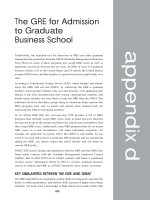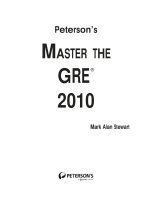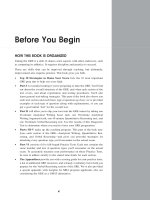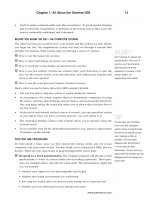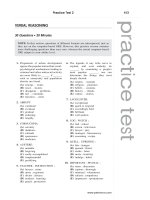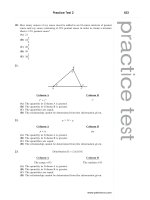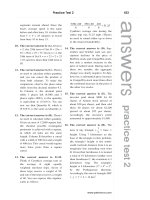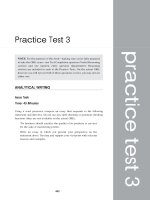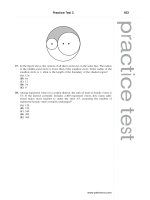Tài liệu Master the Gre 2010 - Part 63 docx
Bạn đang xem bản rút gọn của tài liệu. Xem và tải ngay bản đầy đủ của tài liệu tại đây (55.03 KB, 10 trang )
pristine (adjective) Pure, undefiled. As climbers who have scaled Mt. Everest can
attest, the trails to the summit are hardly in pristine condition and are actually
strewn with trash.
probity (noun) Goodness, integrity. The vicious editorial attacked the moral probity of
the senatorial candidate, saying he had profited handsomely from his pet project,
the senior-citizen housing project.
procure (verb) To obtain by using particular care and effort. Through partnerships
with a large number of specialty wholesalers, W.W. Grainger is able to procure a
startling array of products for its customers, from bear repellent for Alaska
pipeline workers to fork-lift trucks and toilet paper. procurement (noun).
prodigality (noun) The condition of being wastefully extravagant. Richard was
ashamed of the prodigality of his bride’s parents when he realized that the cost of
the wedding reception alone was more than his father earned in one year. prodigal
(adjective).
proliferate (verb) To increase or multiply. For about fifteen years, high-tech com-
panies had proliferated in northern California, Massachusetts, and other regions.
proliferation (noun).
prolixity (noun) A diffuseness; a rambling and verbose quality. The prolixity of
Sarah’s dissertation on Ottoman history defied even her adviser’s attempts to
read it. prolix (adjective).
propagate (verb) To cause to grow; to foster. John Smithson’s will left his fortune for
the founding of an institution to propagate knowledge, leaving open whether that
meant a university, a library, or a museum. propagation (noun).
prophetic (adjective) Auspicious, predictive of what’s to come. We often look at every
event leading up to a new love affair as prophetic—the flat tire that caused us to
be late for work, the chance meeting in the elevator, the horoscope that augured “a
new beginning.” prophecy (noun), prophesy (verb).
propitiating (adjective) Conciliatory, mollifying or appeasing. Management’s offer of
a 5-percent raise was meant as a propitiating gesture, yet the striking workers
were unimpressed. propitiate (verb).
propriety (noun) Appropriateness. Some people expressed doubts about the propriety
of wearing flip-flops to a meeting at the White House.
proximity (noun) Closeness, nearness. Neighborhood residents were angry over the
proximity of the proposed sewage plant to the local elementary school. proximate
(adjective).
pundit (noun) Someone who offers opinions in an authoritative style. The Sunday
morning talk shows are filled with pundits, each with his or her own theory about
the week’s political news.
pungency (noun) Marked by having a sharp, biting quality. Unfortunately, the pun-
gency of the fresh cilantro overwhelmed the delicate flavor of the poached turbot.
pungent (adjective).
purify (verb) To make pure, clean, or perfect. The new water-treatment plant is
supposed to purify the drinking water provided to everyone in the nearby towns.
purification (noun).
Appendix B: Vocabulary List 603
.................................................................
..............................................................................................
WORD ORIGIN
Latin poena 5 pain. Also
found in English impunity,
penal, penalty, and
punishment.
www.petersons.com
Q
quiescent (adjective) In a state of rest or inactivity; latent. Polly’s ulcer has been
quiescent ever since her mother-in-law moved out of the condo, which was well over
a year ago. quiescence (noun).
quixotic (adjective) Foolishly romantic, idealistic to an impractical degree. In the
novel Shoeless Joe, Ray Kinsella carries out a quixotic plan to build a baseball
field in the hopes that past baseball greats will come to play there.
quotidian (adjective) Occurring every day; commonplace and ordinary. Most of the
time, we long to escape from quotidian concerns, but in the midst of a crisis we
want nothing more than to be plagued by such simple problems as a leaky faucet
or a whining child.
R
raconteur (noun) An excellent storyteller. A member of the Algonquin Roundtable,
Robert Benchley was a natural raconteur with a seemingly endless ability to turn
daily life and its irritations into entertaining commentary.
rancorous (adjective) Marked by deeply embedded bitterness or animosity. While
Ralph and Kishu have been separated for three years, their relationship is so
rancorous that they had to hire a professional mediator just to discuss divorce
arrangements. rancor (noun).
rapacious (adjective) Excessively grasping or greedy. Some see global currency specu-
lators like George Soros as rapacious parasites who destroy economies and then
line their pockets with the profits. rapacity (noun).
rarefied (adjective) Of interest or relating to a small, refined circle; less dense,
thinner. Those whose names dot the society pages live in a rarefied world where
it’s entirely normal to dine on caviar for breakfast or order a $2,000 bottle of wine
at Le Cirque. When she reached the summit of Mt. McKinley, Deborah could
hardly breathe in the rarefied air.
raucous (adjective) Boisterous, unruly, and wild. Sounds of shouts and raucous
laughter drifted out of the hotel room where Felipe’s bachelor party was being
held.
reactionary (adjective) Ultra conservative. Every day, more than 20 million listeners
used to tune in to hear Rush Limbaugh spew his reactionary opinions about
“Feminazis” and environmental “fanatics.” reactionary (noun).
recede (verb) To draw back, to ebb, to abate. Once his hairline began to recede, Hap
took to wearing bizarre accessories, like velvet ascots, to divert attention from it.
recession (noun).
reclusive (adjective) Withdrawn from society. During the last years of her life, Garbo
led a reclusive existence, rarely appearing in public. recluse (noun).
recompense (noun) Compensation for a service rendered or to pay for damages. The
5 percent of the estate, which Phil received as executor of his aunt Ida’s will, is
small recompense for the headaches he endured in settling her affairs. recom-
pense (verb).
reconcile (verb) To make consistent or harmonious. Franklin D. Roosevelt’s greatness
as a leader can be seen in his ability to reconcile the differing demands and
values of the varied groups that supported him. reconciliation (noun).
APPENDIXES604
.................................................................
..............................................................................................
www.petersons.com
recondite (adjective) Profound, deep, abstruse. Professor Miyaki’s recondite
knowledge of seventeenth-century Flemish painters made him a prized—if barely
understood—member of the art history department.
redemptive (adjective) Liberating and reforming. While she doesn’t attend formal
church services, Carrie is a firm believer in the redemptive power of prayer.
redeem (verb), redemption (noun).
refractory (adjective) Stubbornly resisting control or authority. Like a refractory
child, Jill stomped out of the car, slammed the door, and said she would walk
home, even though her house was 10 miles away.
relevance (noun) Connection to the matter at hand; pertinence. Testimony in a
criminal trial may only be admitted to the extent that it has clear relevance to the
question of guilt or innocence. relevant (adjective).
reparation (noun) The act of making amends; payment of damages by a defeated
nation to the victors. The Treaty of Versailles, signed in 1919, formally asserted
Germany’s war guilt and ordered it to pay reparations to the allies.
reproof (noun) A reprimand, a reproach, or castigation. Joe thought being grounded
for one month was a harsh reproof for coming home late only once. reprove (verb).
repudiate (verb) To reject, to renounce. After it became known that the politician had
been a leader of the Ku Klux Klan, most Republican leaders repudiated him.
repudiation (noun).
repugnant (adjective) Causing dislike or disgust. After the news broke about Mad
Cow Disease, much of the beef-loving British public began to find the thought of a
Sunday roast repugnant.
requiem (noun) A musical composition or poem written to honor the dead. Many
financial analysts think that the ailing typewriter company should simply say a
requiem for itself and shut down; however, the CEO has other plans.
resilient (adjective) Able to recover from difficulty. A professional athlete must be
mentally resilient, able to lose a game one day and come back the next with
renewed enthusiasm and confidence. resilience (noun).
resonant (adjective) Full of special import or meaning. I found the speaker’s words
particularly resonant because I, too, had served in Vietnam and felt the same
mixture of shame and pride. resonance (noun).
resplendent (adjective) Glowing, shining. In late December, midtown New York is
resplendent with holiday lights and decorations. resplendence (noun).
rite (noun) Ceremony. From October to May, the Patwin Indians of California’s
Sacramento Valley held a series of rites and dances designed to bring the tribe
health and prosperity.
rogue (noun) A mischievously dishonest person; a scamp. In Jane Austen’s Pride and
Prejudice, Wickham, a charming rogue, seduces Darcy’s young sister Georgiana
and later does the same thing with Lydia Bennet.
ruffian (noun) A brute, roughneck, or bully. In Dickens’s Oliver Twist, Fagin instructs
his gang of orphaned ruffians on the arts of picking pockets and shoplifting.
rumination (noun) The act of engaging in contemplation. Marcel Proust’s semi-
autobiographical novel cycle Remembrance of Things Past is less a narrative
than an extended rumination on the nature of memory. ruminate (verb).
Appendix B: Vocabulary List 605
.................................................................
..............................................................................................
WORD ORIGIN
Latin frangere 5 to break. Also
found in English fraction,
fractious, fracture, frangible,
infraction, and refract.
www.petersons.com
S
sage (noun) A person of great wisdom, a knowing philosopher. It was the Chinese sage
Confucius who first taught what is now known the world over as “The Golden Rule.”
sagacious (adjective), sagacity (noun).
salutary (adjective) Restorative, healthful. I find a short dip in an icy stream to be
extremely salutary, although the health benefits of my bracing swims are, as yet,
unclear.
sanction (verb) Support or authorize. Even after a bomb exploded on the front porch
of his home, the Reverend Martin Luther King Jr. refused to sanction any violent
response and urged his angry followers to love their enemies. sanctify (verb),
sanction (noun).
sap (verb) To exhaust, to deplete. The exhaustive twelve-city reading tour so sapped
the novelist’s strength that she told her publicist that she hoped her next book
would be a flop! While the African nation was making enormous economic strides
under its new president, rebel fighting had sapped much of the country’s
resources.
satiate (verb) To fulfill to or beyond capacity. Judging by the current crop of films
featuring serial killers, rape, ritual murder, gun-slinging, and plain old-
fashioned slugfests, the public appetite for violence has not yet been satiated.
satiation (noun), satiety (noun).
saturate (verb) To drench or suffuse with liquid or anything that permeates or
invades. The hostess’s furious dabbing at the tablecloth was in vain, since the
spilt wine had already saturated the damask cloth. saturation (noun), saturated
(adjective).
scrutinize (verb) To study closely. The lawyer scrutinized the contract, searching for
any detail that could pose a risk for her client. scrutiny (noun).
scurvy (adjective) Shabby, low. I couldn’t believe that Farouk was so scurvy as to open
up my computer files and read my e-mail.
sedulous (adjective) Diligent, industrious. Those who are most sedulous about
studying this vocabulary list are likely to breeze through the antonyms sections of
their GRE.
sequential (adjective) Arranged in an order or series. The courses required for the
chemistry major are sequential; you must take them in the prescribed order,
because each course builds on the previous ones. sequence (noun).
sidereal (adjective) Relating to the stars or the constellations. Jacqueline was inter-
ested in matters sidereal and was always begging my father to take the dusty old
telescope out of our garage.
signatory (noun) Someone who signs an official document or petition along with
others. Alex urged me to join the other signatories and add my name to the
petition against toxic sludge in organic foods, but I simply did not care enough
about the issue. The signatories of the Declaration of Independence included John
Adams, Benjamin Franklin, John Hancock, and Thomas Jefferson.
sinuous (noun) Winding, circuitous, serpentine. Frank Gehry’s sinuous design for the
Guggenheim Museum in Bilbao, Spain, has led people to hail the museum as the
first great building of the twenty-first century. sinuosity (noun).
APPENDIXES606
.................................................................
..............................................................................................
WORD ORIGIN
Latin salus 5 health. Also found
in English salubrious, salutation,
and salute.
WORD ORIGIN
Latin sequi 5 to follow. Also
found in English consequence,
sequel, and subsequent.
www.petersons.com
specious (adjective) Deceptively plausible or attractive. The infomercial for Fat-Away
offered mainly specious arguments for a product that is, essentially, a heavy-duty
girdle.
splice (verb) To unite by interweaving separate strands or parts. Amateur filmmaker
Duddy Kravitz shocked and angered his clients by splicing footage of tribal
rituals into his films of their weddings and bar mitzvahs.
spontaneous (adjective) Happening without plan or outside cause. When the news of
John F. Kennedy’s assassination hit the airwaves, people everywhere gathered in
a spontaneous effort to express their shock and grief. spontaneity (noun).
spurious (adjective) False, fake. The so-called Piltdown Man, supposed to be the fossil
of a primitive human, turned out to be spurious, though who created the hoax is
still uncertain.
squander (verb) To use up carelessly, to waste. Those who had made donations to the
charity were outraged to learn that its director had squandered millions on fancy
dinners, first-class travel, and an expensive apartment for entertaining.
stanch (verb) To stop the flow. When the patient began to bleed profusely, the doctor
stanched the blood flow by applying direct pressure to the wound.
stint (verb) To limit, to restrain. The British bed and breakfast certainly did not stint
on the breakfast part of the equation; they provided us with fried tomatoes, fried
sausages, fried eggs, smoked kippers, fried bread, fried mushrooms, and bowls of
a cereal called Wheatabix (which tasted like cardboard). stinting (adjective).
stolid (adjective) Impassive, unemotional. The popular animated television series
King of the Hill chronicles the woes of a stolid, conservative Texan confronting
changing times. stolidity (noun).
subordination (noun) The state of being subservient or treated as less valuable.
Heather left the naval academy because she could no longer stand the subordi-
nation of every personal whim or desire to the rigorous demands of military life.
subordinate (verb).
subpoena (noun) An order of a court, legislation, or grand jury that compels a
witness to be present at a trial or hearing. The young man’s lawyer asked the
judge to subpoena a boa constrictor into court on the grounds that the police had
used the snake as an “instrument of terror” to coerce his client’s confession.
subside (verb) To settle or die down. The celebrated lecturer had to wait 10 minutes
for the applause to subside before he began his speech.
subsidization (noun) The state of being financed by a grant from a government or
other agency. Without subsidization, the nation’s passenger rail system would
probably go bankrupt. subsidize (verb).
substantiated (adjective) Verified or supported by evidence. The charge that Nixon
had helped to cover up crimes was substantiated by his comments about it on a
series of audiotapes. substantiate (verb), substantiation (noun).
subsume (verb) To encompass or engulf within something larger. In Alan Dershow-
itz’s Reversal of Fortune, he makes it clear that his work as a lawyer subsumes
his personal life.
subterranean (adjective) Under the surface of the earth. Subterranean testing of
nuclear weapons was permitted under the Nuclear Test Ban Treaty of 1963.
Appendix B: Vocabulary List 607
.................................................................
..............................................................................................
www.petersons.com
